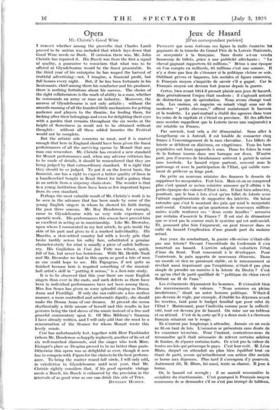Opera
Mr. Christie's Good Wine I FORGET whether among the proverbs that Charles Lamb proved to be untrue was included that which lays down that Good Wine needs no Bush. If omission there was, Mr. John Christie has repaired it. His Busch was from the first a signal of quality, a guarantee to musicians that what was to be offered at Glyndebourne would be the finest procurable. In the third year of his enterprise he has reaped the harvest of truthful advertising—not, I imagine, a financial profit, but full houses every night. But, if he has been fortunate in his lieutenants, chief among them his conductor and his producer, there is nothing fortuitous about his success. The choice of the right collaborators is the mark of ability in a man, whether he commands an army or runs an industry. Moreover, the success of Glyndebourne is not only artistic ; without the smooth running of all the hundred little mechanisms for getting audience and players to the theatre, for feeding them, for looking after their belongings and even for delighting their eyes with a garden that remains throughout the six weeks at the height of floweriness (a result not to be obtained without thought) : without all these added luxuries the Festival would not be complete.
But the artistic side concerns us most, and it is marvel enough that here in England should have been given the finest performances of all the surviving operas by Mozart that any man can remember. Mr. Christie has created a new standard for Mozart performances and, when any adverse criticism has to be made of details, it should be remembered that they arc being judged by that extraordinary standard. It is right that they should be so judged. To put it on the lowest basis, the financial, one has a right to expect a better quality of linen in a handkerchief bought in Bond Street for half a guinea than in an article from a sixpenny chain-store. The wonder is that in a young institution there have been so few important lapses from its own standard.
Perhaps the most valuable result of Mr. Christie's work is to be seen in the advance that has been made by some of the young English singers in whom he showed his faith during the past three seasons. Mr. Roy Henderson, for example, came to Glyndebourne with no very wide experience of operatic work. His performances this season have proved him as excellent in acting as in musicianship. Like Mr. Brownlee, upon whom I commented in my last article, he gets inside the skin of his part and gives to it a marked individuality. His Masetto, a slow-witted country lad with a lovely grin that broke tardily across his sulky face, substituted a genuine eharacter-study for what is usually a piece of oafish buffoon- ery. His Gugliehno in Cosi fan Tutte was robust, quick, frill of fun, but never too boisterous. With Mr. Heddle Nash and Mr. Brownlee we had in this opera as good a trio of men as one could hope to see. His Papageno, if not quite so finished because here is required something of the musical- hall artist's skill in " putting it across," is a first-rate study.
It is to be observed that this year there are more English singers than ever in the casts, and such defects as there have been in individual performances have not been among them. Miss Ina Souez has given us some splendid singing as Donna Anna and Fiordiligi. If only she can cultivate a less restless manner, a more controlled and aristocratic dignity, she should make the Donna Anna of our dreams. At present she seems rhythmically a little unsure of herself and this results in her gestures being the tied slaves of the music instead of a free and graceful commentary upon it. Of Miss Mildmay's Susanna I have already written, and I will only add that she must be a reincarnation of the Storace for whom Mozart wrote this lovely music.
Cosi has unfortunately lost, together with Herr Fassbander (whom Mr. Henderson so happily replaced), another of its set of
six well-matched diamonds, and the singer who took Mme. Eisinger's place as Despina proved to be no better than paste. Otherwise this opera was as delightful as ever, though it now has to compete with Figaro for the claim to be the best perform- ance. To bring the matter round full circle, I will only add, in valediction to Glyndebourne until next year, that Mr. Christie rightly considers that, if his good operatic vintage needs a Busch, his Busch is enhanced by the provision in the intervals of as good wine as one can drink this side of Trier.
DYNELEY HLTSSEY.














































 Previous page
Previous page